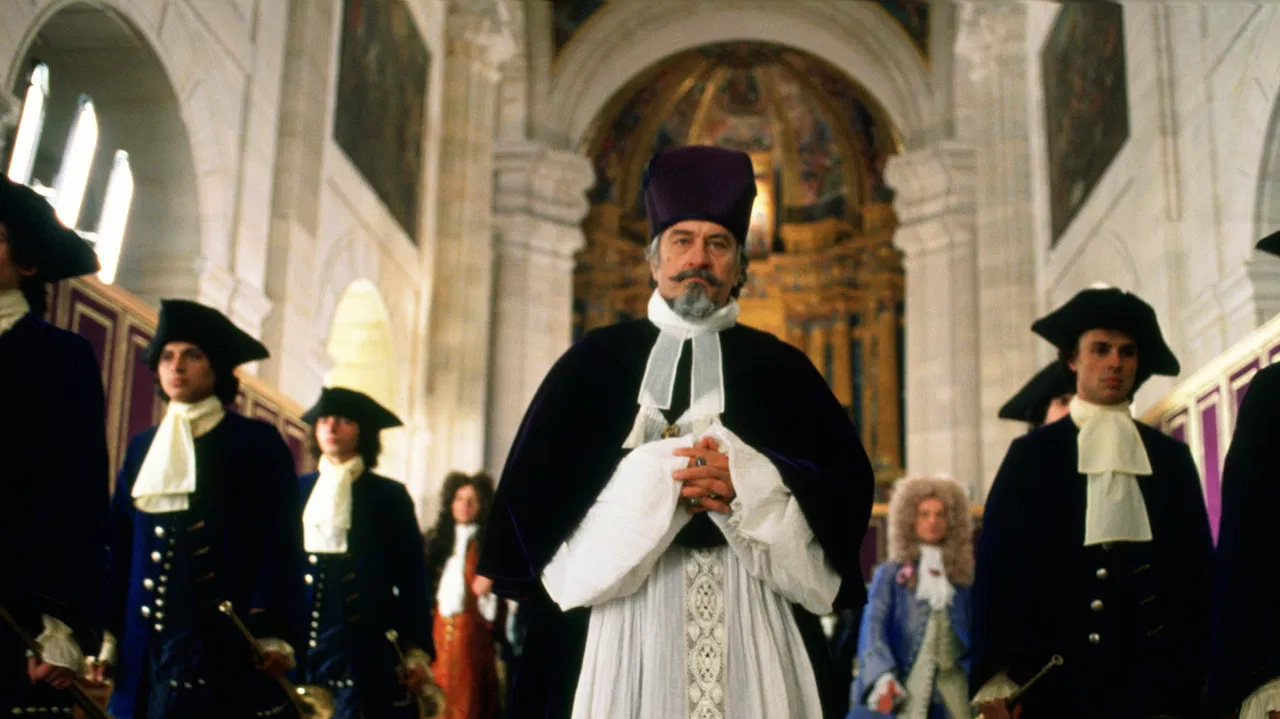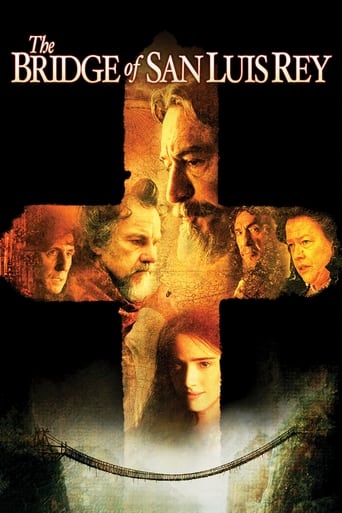

Have you ever spoken with a person who relates a long drawn out event but seems more intent on throwing in reams of peripheral details and window dressing rather than coming to the point? Well this production does exactly that. Artistically and dramatically this film is sound and in some respects exemplary, however I constantly found my mind wandering as the scenes dragged on. In addition, the setting was flawed. The filth, squalor and disease that permeated Spanish colonies was largely hidden in favor of a squeaky clean environment of immaculate costumes, elaborate furnishings and polite and orderly peasantry.Part of me was tempted to re-view the production to gain a heightened appreciation of the characters and their interaction but I quickly dismissed the thought, lest I fall asleep and miss something more gratifying.
... View MoreBooks can be tough to film unless they are straightforward stories, as "The Godfather" or "Lonesome Dove". "The Bridge of San Luis Rey", besides being written in a gorgeous, simple, lyrical style, has an inner faucet of irony that drips nearly all the way through. We are looking into a world that we are allowed to feel above, but that we are gradually drawn into by the sufferings and humanity of the characters, till quiet thunder explodes in perhaps the most memorable closing lines in American Literature. That would not be easy to film. The first question a director must ask, narrative or no narrative?. To add narrative allows that overview that is irony but can detract from reality of the scenes reducing their emotional impact. To go without forces a more linear stream that loses that overview and is tricky, requiring balance and intuition to arrive at the ending with impact. I'm afraid the director lacked either quality, or was so intimidated by the star laden cast that she bowed to their wishes. At any rate the movie isn't much short of travesty, telling neither a fathomable story or creating a mythic quality that might have replaced it. It is splashy, disjointed, and incoherent. If you haven't read the book please don't judge it by this movie. "The Bridge of San Luis Rey" is one of the finest works in the language. The movie, for all its good intentions, fails in just about every way of expressing what the book is about.
... View MoreI was somewhat in doubt whether the movie was intended to be tragedy or comedy, historical or philosophical. Whatever, the actors obviously had fun dressing up and "play acting." In any event, although I napped every now and then, this nicely filmed and acted, and very unusual film did have interesting moments, and I think I will watch it again. But my first response was to be intrigued by the name "Perichole." My Spanish dictionary drew a blank on "chole" so I suppose Wikipedia's article quoted in part below suggesting it is a derivative of "cholo" is accurate. The film does have the actress boasting that she was, at least in part, of Spanish blood. However, I don't buy Wikipedia's claim that "perri" derives from "perro," although it might also fit the character. My Spanish dictionary has a slew of words beginning with "peri" but I thought the most applicable was the first entry which says:"1. A beautiful and beneficent fairy in Persian mythology." Wikipedia suggests that Thornton Wilder lifted the basic characters from Micaela Villegas' tale: "La Périchole's title character is based on Micaela Villegas (1748-1819), a beloved Peruvian entertainer and the famous mistress of Manuel de Amat y Juniet, Viceroy of Peru from 1761 to 1776. The name "La Périchole" is a French adaptation of a Spanish-language epithet by which Amat referred to Villegas: "La Perricholi" (the word derives from either perro, "dog," or perra, "bitch," and cholo, "of mixed blood")."And the Tag line in IBMD's article on the 1944 film simply equates "perichole" with "Beautiful . . . Bewitching." Which convinces me that such was Villegas' intent. Puns are so interesting when one is naming characters.
... View MoreThe most stunning thing about this film is that with all the talent gathered together none is at all visible - with the exception of Pilar Lopez De Ayala, who is literally the only believable persona in this unimaginatively directed, unintelligently constructed adaptation of what I would imagine is a delicate and resonant piece of literature, reading between the lines. Shockingly, the American actors lumber through the whole non-event looking like they're in the middle of rehearsal for some middle-aged pantomime forced on them by some Mid-West theater group, lacking any kind of dedication or true understanding of the words blustering from their lips. The performances are gruesomely ham-fisted and horribly one-dimensional - the pivotal "trial" featuring DeNiro, F. Murray Abraham and (non American) Gabriel Byrne as exciting and as heart-felt as watching the real-life trial of someone being accused of stealing the wheels off a tricycle. Even the ending smacks of: "Right, film's done, let's get on with the end scene", it's that dismally executed. The whole thing smacks of a cynical "film packaging" ethic - grabbing as many "names" as possible - the only passion perhaps the desire of the cast to have a bit of a "get-away" on a location they haven't been to as yet in their careers, all expenses paid. "Let's put bums on the seat, who cares about the film really, it'll look good on the DVD cover, we'll put nothing into it and it'll still sell". Among the countless excruciating presences include the clichéd non-acting of identical twins The Polish Brothers - who seem only to exist in order to fulfill such hideously stereotypical moments in film - and the wastefully camp presence of Dominique Pinon who at least assures us his English is fabulous. No texture, no taste, no sensation of the world or time we are supposed to be in is ever allowed to filter in this worst of TV movies and we are left absolutely care-less of any singular person we have been forced to watch for what seems to be a whole mini-series length of time. With all the disinterest on display from both sides of the camera, one wishes the tiny presence of John Lynch was expanded to obliterate all the rest: he conveys such a world of emotion in a single glance it makes you wish the story was about him, not the fumbling cast collecting their pay checks and drinking with the "natives" around him. A shame on everyone: if this were the first film that Deniro, Byrne, Keitel, Bates, and the rest were in, they would never have made it out of the D-list.
... View More